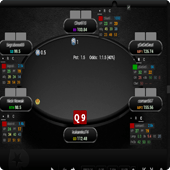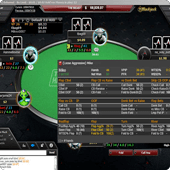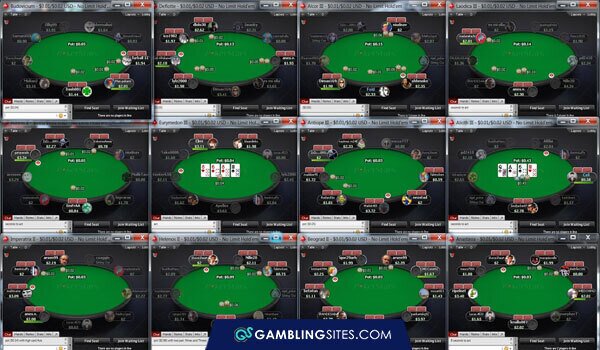Where Can You Use Poker HUDs Online—and Should You?

Online poker heads-up displays (HUDs) have been a major component in the virtual toolboxes of most serious top online poker sites for players since the turn of the 21st century. Oddly, though, few players outside the pro level are aware of them, and fewer still use one.
For the uninitiated: Poker HUDs are programs that run on your PC that do two things: They build a database of the various online poker players and their play during each hand, then develop statistics based on those actions and display them on-screen, usually next to each player.
The information the HUDs are presenting is not top secret-burn-before-reading stuff—it is all derived from the hand histories most poker sites send to their players.
But poker HUDs have become something of a boogieman to many players, many of whom claim that players who use HUDs (usually professional poker players) have an unfair advantage over those who do not (typically recreational poker players).
Poker Rooms That Allow HUDs
Before we get into any specifics, how about we give you an answer right away as to which online poker sites allow HUDs?
Below is a (small) selection of poker sites that do, in fact, permit the use of HUDs. As the war for and against HUDs continues, you’ll find many changes, so be sure to read your chosen site’s rules and terms & conditions to ensure you’re getting the sort of HUD access you want.
| Poker Site | HUD Permitted | Anonymous Table |
| BetOnline | Yes | Tournament play only |
| SportsBetting.ag | Yes | No |
Right now BetOnline and SportsBetting.ag are your best bets as far as safe and trusted online casinos or poker rooms go. Of course, it’s worth noting that some poker sites do technically allow HUDs, but have taken measures to basically nullify their impact.
HUDs or not, you also will likely be interested in finding the very best online poker rooms available. If you don’t have one to call home just yet, consider the following poker sites.
Poker Rooms That Do Not Allow HUDs at All
You’ll not see that some of these sites don’t necessarily ban HUDs specifically but rather restrict the HUD’s usefulness organically through anonymous tables. As noted above, check your selected online poker room’s terms & conditions and rules to ensure you will have the sort of poker experience you desire.
| Poker Site | HUD Permitted | Anonymous Table |
| Global Poker | No | No |
| Bovada | No | Yes |
| Ignition Poker | No | Yes |
| Unibet Poker | No | Player’s Choice |
| Party Poker | No | Cash Games |
The Truth About HUDs

Online poker is a billion-dollar industry driven by hundreds of thousands of poker players, many of whom play for hours a day, grinding away at multiple tables to earn their daily bread.
These are not recreational players – they’re pro-level poker players who pay their bills through determined and skilled online poker play.
And they’re not each settled into a single “chair” in the virtual poker room. No. These pros have ten or more tables open on the screen—and they need something to help them make solid but quick decisions at each table.
They need to know when to hold’em. They need to know when to fold’em. And since most of them don’t have Kenny Rogers on speed-dial, their only recourse is to find a program that can assist them in evaluating the proper actions in every step of the game.
Enter the poker HUD.
If there weren’t a market for poker HUDs, there wouldn’t be so much competition for the public’s HUD dollar.
The Tip of the Poker HUD Informational Iceberg
Even if you have not been intimately involved with data manipulation, you can probably guess the meaning of the term “firehose” when applied to information. In the data world, it means a huge continuous stream of data.
Well, poker HUDs aren’t quite that bounteous, but you will find far more information about your opponents at the poker table than you could even imagine needing. Of course, with a bit of study, you’ll find that almost all of the information presented by the HUD is quite useful.
As you might imagine, the best poker HUDs tend to be the ones that have been around the longest. Foremost is Poker Tracker, first introduced in 2001. Poker Tracker is the program the others seek to duplicate or—if possible—exceed. Some of those notable competitors are Poker Copilot and Holdem Manager (both first released in 2008).
Here are just a few of the stats the various poker HUDs track.
VPIP
Short for “voluntarily put in pot.” This tracks the percentage of times a player plays hands when he could have folded at no cost (outside of the blinds, in other words).
A high VPIP generally indicates a loose, inexperienced player.
PFR
This is a “pre-flop raise”—the percentage of times an opponent raises before the flop. It can give the player a good picture of the range of hands he plays.
Called PFR
This is a stat indicating how often the opponent called a pre-flop raise. Since a pre-flop raise (typically a 3-bet) should only be called with a hand worth a 4-bet (or better), the called PFR statistic can indicate an opponent who overplays hands destined to lose.
AF
No, that doesn’t mean what you think it means. In poker stats, it means aggression frequency and is presented as four distinct numbers: Preflop AF, Flop AF, Turn AF, and River AF.
Aggression frequency tells you many things, depending on the other stats available.
C-Bet/Fold to C-Bet
These two stats tell you how often the opponent makes continuation bets and how often he folds to continuation bets. The latter stat is handy because bluffing with a C-bet after the flop against an opponent with a record of never folding to a c-bet is not a winning strategy.
What HUDs Aren’t

Don’t confuse poker HUDs with poker-playing bots. A poker HUD won’t tell you anything that all the other players at the table don’t know. You’re not getting to see people’s hole cards.
HUDs don’t play poker for you. Yes, some programs do that. And no, those programs are almost universally banned.
Poker bots employ screen scrapers –specialized programs that “read” the onscreen game as the play progresses, making independent playing decisions—calls, folds, raises—all based on criteria you have set.
In any case, HUDs aren’t the insta-win app some people think them to be. There’s still a steep learning curve involved while trying to fully comprehend the tsunami of statistics your HUD will present to you. Even on a single table, you’ll have a hundred or so numbers to consider before you call, raise, or fold.
Now, try doing that while playing 24 tales simultaneously.
Incidentally, most poker sites provide the best poker apps for players.
HUDs and the Law

Are poker HUDs illegal? In a word, no. They don’t reveal information you should not be privy to, such as an opponent’s hole cards during play.
In fact, you won’t find out about the opponent’s hole cards at all unless he goes to a showdown at the river. They neither defraud nor steal money or information from your opponents. Recently, there’s been a move to restrict or eliminate poker HUDs in online play, but the effort seems misguided.
Poker HUDs are built around the post-play hand histories provided to all players at the various poker sites.
So, it is for poker HUDs. They don’t give away confidential information. However, they display information and statistical tendencies you might not become aware of in a matter of days, let alone in seconds.
While poker HUDs are not illegal, many people don’t like them for that reason. And some poker sites have gone so far as to prohibit HUDs in most or all circumstances (sit ‘n goes, cash games, tournaments).
Oddly enough, the poker sites themselves created the need for some mechanism that could interpret the voluminous hand histories they send to each player.
So ancillary programs were developed to digest these hand histories, refining the raw data into a vast array of statistics concerning each player’s proclivities, habits, and style of play.
Ways Sites May Discourage HUDs
HUDs have had one deleterious effect on online poker play: They have driven the recreational player—typically, the lesser experienced players who are most likely to lose money—away.
Because banning poker players who use a HUD seems a rather draconian business policy, the sites have instead simply implemented other strategies designed to curb their use.
Anonymous games
Probably the most popular method of excluding HUD usage without actively banning it is making each player anonymous through the best satellite poker sites.
Each player assigned a seat at the virtual poker table is given a number. Suppose the usage of a HUD is not prohibited. In that case, it is rendered less effective because it cannot give you reliable data for a particular player outside of the current session at that specific table.
Quick Seating
This feature employed by some online poker sites forces players to take a seat at the next available table dealing at the player’s chosen bet limit. This keeps (for example) HUD users from selecting a table with the highest percentage of previously identified fish.
Limiting Multi-Table Play
Some poker sites will limit the number of tables players may actively play at simultaneously. Since one of the poker HUD’s primary purposes is to facilitate very quick decisions on multiple hands of poker, limiting the number of tables you can play at the same time tends to obviate that usefulness.
Fewer Rewards
Pro players play poker at sites that not only afford them the greatest likelihood to win but also those that offer Rakeback—a percentage of the small amount the poker site racks from the pot after each hand.
That might seem like an insignificant amount but remember: Pro poker players aren’t playing one or two tables. They’re on 12-24 tables simultaneously.
Can you say ca-CHING?!
Is It Wrong to Use HUD?
A professional football team will study the various plays used by its competitors. So does every team in the NBA. Heck, they even made a movie of the way major league baseball benefited from the statistical analysis: Moneyball.
Looking back, it’s easy to see how inevitable poker HUDs were, what with the dozens of tables available for simultaneous play—something undreamt before the internet.
Toss that most online poker sites have always provided detailed hand histories within moments of each hand’s completion, and it’s almost impossible not to think of all that information going to waste.
And that’s all HUDs do—they massage the data provided to the player by the poker site and present it to the player as an overlay to the online poker table.
Sure, recreational players are at a disadvantage against pros who use HUDs to maximize their play—but then again, how many recreational players sit down for a 45-minute session at the $100/$200 NL table?

Still, even recreational players can benefit from the information these poker HUDs provide, and the money spent purchasing even the best poker HUDs is offset quickly by the money saved in unplaced and sloppy play curtailed, bad wagers, unplaced and sloppy play curtailed, all through the judicious use of the poker HUD.
So don’t discount poker HUDs, and don’t fear them. And regardless of whether you decide to play with a HUD or without, be sure to check out our list of the less popular poker games you need to learn.
 80%
80% 75%
75%
